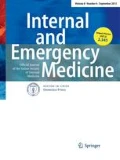Abstract
Community-acquired pneumonia (CAP) is frequent and can be life-threatening. Streptococcus pneumoniae is the main bacteria involved, and is susceptible to penicillin A. Rapid microbiological diagnosis could then help reduce the antimicrobial spectrum. The pneumococcal urinary antigen (PUA) test is fast and easy to perform, but its impact on antimicrobial prescription and cost-effectiveness in emergency departments (ED) is not well known. We performed a pragmatic real life retrospective study in an adult ED to assess its usefulness: proportion of positive results, impact on antimicrobial prescriptions and cost-effectiveness. Over 3 years (from January 1st 2012 to December 31st 2014), 979 PUA tests were reutilized in our ED among 1224 patients who consulted for CAP; 51 (5.2%) were positive. Among them, 10 led to a modification of the antimicrobial treatment, but only 7 (14.3%) were in accordance with the results. The total cost of a PUA test is 27€. As only 7 PUA tests led to appropriate antimicrobial modification, we deemed that 972 had no impact, and the potential cost savings, if the test had not been used, would have been 26,244 € (972 × 27) during 3 years, that is 8748 € per year. Thus, it seems that the PUA test should not be generally used in the ED considering its low rate of positivity and the difficulties for physicians to adapt antibiotic treatment accordingly. This attitude change in utilization would lead to substantial cost savings.

Similar content being viewed by others
References
Yealy DM, Auble TE, Stone RA et al (2004) The emergency department community-acquired pneumonia trial: methodology of a quality improvement intervention. Ann Emerg Med 43:770–782. doi:10.1016/S0196064403010059
Niederman MS, McCombs JS, Unger AN et al (1998) The cost of treating community-acquired pneumonia. Clin Ther 20:820–837
Woodhead M (2002) Community-acquired pneumonia in Europe: causative pathogens and resistance patterns. Eur Respir J Suppl 36:20s–27s
Mandell LA, Wunderink RG, Anzueto A et al (2007) Infectious Diseases Society of America/American Thoracic Society consensus guidelines on the management of community-acquired pneumonia in adults. Clin Infect Dis 44(Suppl 2):S27–S72
SPILF (2006) 15th consensus conference about management of lower respiratory tract infections in immunocompetent adults. Med Mal Infect 36:235–244
British Thoracic Society (2015) Annotated BTS Guideline or the management of CAP in adults—Summary of recommendations. https://www.brit-thoracic.org.uk/document-library/clinical-information/pneumonia/adult-pneumonia/annotated-bts-cap-guideline-summary-of-recommendations/. Accessed 10 Nov 2016
Sinclair A, Xie X, Teltscher M, Dendukuri N (2013) Systematic review and meta-analysis of a urine-based pneumococcal antigen test for diagnosis of community-acquired pneumonia caused by Streptococcus pneumoniae. J Clin Microbiol 51:2303–2310
Matta M, Kernéis S, Day N et al (2010) Do clinicians consider the results of the BinaxNOW Streptococcus pneumoniae urinary antigen test when adapting antibiotic regimens for pneumonia patients? Clin Microbiol Infect 16:1389–1393
Choi MJ, Song JY, Cheong HJ et al (2015) Clinical usefulness of pneumococcal urinary antigen test, stratified by disease severity and serotypes. J Infect Chemother 21:672–679. doi:10.1016/j.jiac.2015.06.003
Andreo F, Prat C, Ruiz-Manzano J et al (2009) Persistence of Streptococcus pneumoniae urinary antigen excretion after pneumococcal pneumonia. Eur J Clin Microbiol Infect Dis 28:197–201. doi:10.1007/s10096-008-0606-3
Watanabe H, Uruma T, Tazaki G et al (2015) Clinical factors associated with negative urinary antigen tests implemented for the diagnosis of community-acquired pneumococcal pneumonia in adult patients. Med Princ Pract 24:189–194. doi:10.1159/000369931
Mothes A, Léotard S, Nicolle I et al (2016) Community-acquired pneumonia and positive urinary antigen tests: factors associated with targeted antibiotic therapy. Médecine Mal Infect. doi:10.1016/j.medmal.2016.05.009
Kennedy M, Bates DW, Wright SB et al (2005) Do emergency department blood cultures change practice in patients with pneumonia? Ann Emerg Med 46:393–400
Ramanujam P, Rathlev NK (2006) Blood cultures do not change management in hospitalized patients with community-acquired pneumonia. Acad Emerg Med 13:740–745
Schouten JA, Hulscher MEJL, Natsch S et al (2007) Barriers to optimal antibiotic use for community-acquired pneumonia at hospitals: a qualitative study. Qual Saf Health Care 16:143–149
Blanc V, Mothes A, Smetz A et al (2015) Severe community-acquired pneumonia and positive urinary antigen test for S. pneumoniae: amoxicillin is associated with a favourable outcome. Eur J Clin Microbiol Infect Dis 34:2455–2461. doi:10.1007/s10096-015-2503-x
Roger P-M, Risso K, Hyvernat H et al (2010) Urinary pneumococcal or Legionella antigen detection tests and low-spectrum antibiotic therapy for community-acquired pneumonia [Article in French]. Médecine Mal Infect 40:347–351. doi:10.1016/j.medmal.2010.01.005
Alere BinaxNOW® Streptococcus pneumoniae. http://www.alere.com/fr/home/product-details/binaxnow-streptococcus-pneumoniae.html. Accessed 10 Nov 2016
Falguera M, Ruiz-González A, Schoenenberger JA et al (2010) Prospective, randomised study to compare empirical treatment versus targeted treatment on the basis of the urine antigen results in hospitalised patients with community-acquired pneumonia. Thorax 65:101–106. doi:10.1136/thx.2009.118588
Sinclair A, Xie X, Dendukuri N (2012) The clinical effectiveness and cost of a pneumococcal urine antigen immunochromatographic test (BinaxNOW Streptococcus pneumoniae) in the diagnosis of community acquired Streptococcus pneumoniae pneumonia in patients admitted to hospital. Report no. 57. http://www.crd.york.ac.uk/crdweb/ShowRecord.asp?ID=32012000049. Accessed 10 Nov 2016
Dirou S, Cazanave C (2015) Urine antigen testing: indication and contribution to the treatment of community-acquired pneumonia [Article in French]. Rev Mal Respir 32:845–849. doi:10.1016/j.rmr.2015.06.004
Acknowledgement
Elodie Choisy.
Author information
Authors and Affiliations
Corresponding author
Ethics declarations
Conflict of interest
The authors declare that they have no conflict of interest.
Funding
None.
Statement of human and animal rights
All procedures performed in studies involving human participants were in accordance with the ethical standards of the Ambroise Paré hospital institutional research committee and with the 1964 Helsinki declaration and its later amendments.
Informed consent
For this type of study, formal consent is not required.
Rights and permissions
About this article
Cite this article
Dinh, A., Duran, C., Davido, B. et al. Cost effectiveness of pneumococcal urinary antigen in Emergency Department: a pragmatic real-life study. Intern Emerg Med 13, 69–73 (2018). https://doi.org/10.1007/s11739-016-1586-4
Received:
Accepted:
Published:
Issue Date:
DOI: https://doi.org/10.1007/s11739-016-1586-4




